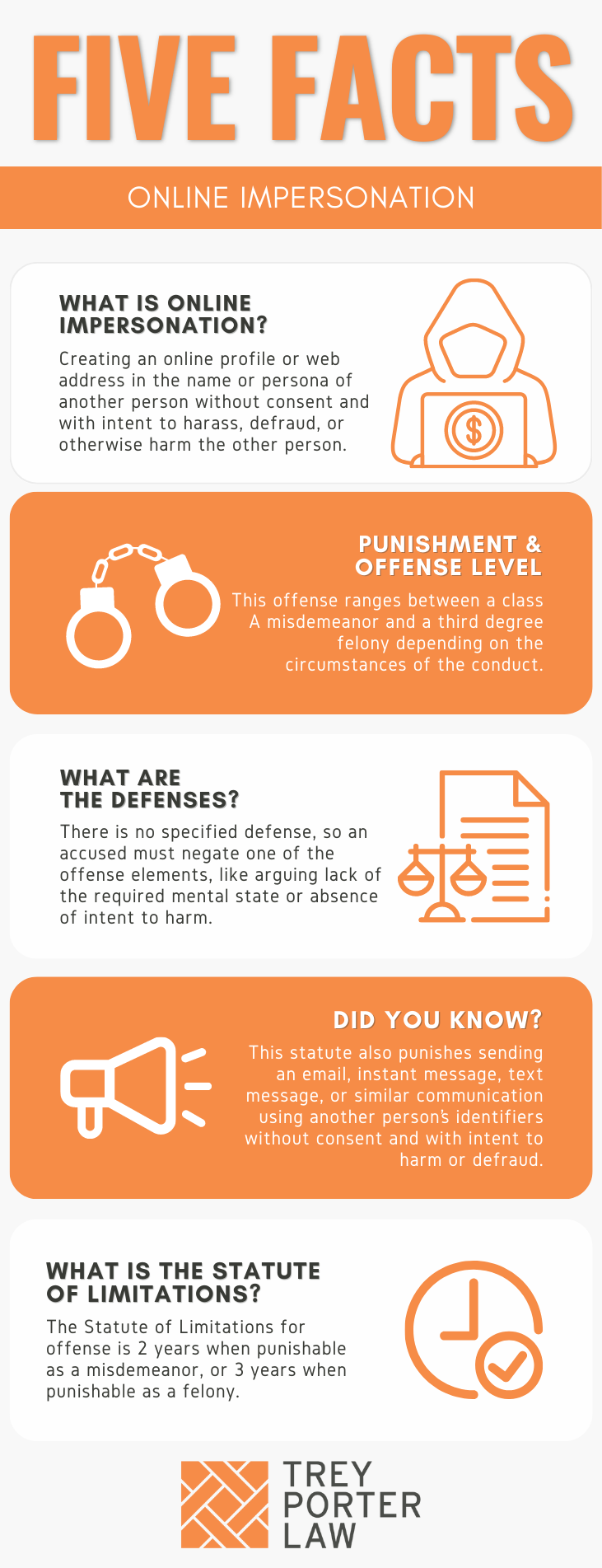WHAT IS ONLINE IMPERSONATION IN TEXAS?
The Texas law against online impersonation prohibits using another’s name or persona without permission to create a web page, or post or send messages on or through social media or other websites. Online impersonation is also committed by sending an email, instant message, text message, or similar communication using another person’s identifiers without that person’s consent.
WHAT IS THE ONLINE IMPERSONATION LAW IN TEXAS?
Tex. Penal Code § 33.07. ONLINE IMPERSONATION.
(a) A person commits an offense if the person, without obtaining the other person’s consent and with the intent to harm, defraud, intimidate, or threaten any person, uses the name or persona of another person to:
(1) create a web page on a commercial social networking site or other Internet website; or
(2) post or send one or more messages on or through a commercial social networking site or other Internet website, other than on or through an electronic mail program or message board program.
(b) A person commits an offense if the person sends an electronic mail, instant message, text message, or similar communication that references a name, domain address, phone number, or other item of identifying information belonging to any person:
(1) without obtaining the other person’s consent;
(2) with the intent to cause a recipient of the communication to reasonably believe that the other person authorized or transmitted the communication; and
(3) with the intent to harm or defraud any person.
(c) An offense under Subsection (a) is a felony of the third degree. An offense under Subsection (b) is a Class A misdemeanor, except that the offense is a felony of the third degree if the actor commits the offense with the intent to solicit a response by emergency personnel.
(d) If conduct that constitutes an offense under this section also constitutes an offense under any other law, the actor may be prosecuted under this section, the other law, or both.
(e) It is a defense to prosecution under this section that the actor is any of the following entities or that the actor’s conduct consisted solely of action taken as an employee of any of the following entities:
(1) a commercial social networking site;
(2) an Internet service provider;
(3) an interactive computer service, as defined by 47 U.S.C. Section 230;
(4) a telecommunications provider, as defined by Section 51.002, Utilities Code; or
(5) a video service provider or cable service provider, as defined by Section 66.002, Utilities Code.
WHAT IS THE PENALTY CLASS FOR ONLINE IMPERSONATION IN TEXAS?
Online impersonation committed by using another’s personal information to create a web page or post or send a message on or through a social media site is a third degree felony, punishable by two to ten years in prison.
Online impersonation is a Class A misdemeanor, punishable by up to one year in county jail, if committed by sending an electronic communication using another’s identifying information. If, however, the communication is intended to solicit a response from emergency personnel, the online impersonation is a third degree felony.
WHAT IS THE PUNISHMENT RANGE FOR ONLINE IMPERSONATION IN TEXAS?
The punishment range for online impersonation charged as a Class A misdemeanor is up to one year in jail, and a maximum $4,000 fine. If charged as a third degree felony, online impersonation carries between two and ten years in prison, and a maximum $10,000 fine.
WHAT ARE THE PENALTIES FOR ONLINE IMPERSONATION IN TEXAS?
A person charged with online impersonation may be eligible for probation after a conviction, or deferred adjudication without a conviction. The period of community supervision for online impersonation charged as a Class A misdemeanor may not exceed two years. A person charged with third degree felony online impersonation may be placed on probation for a term between two and five years, or deferred adjudication for up to ten years.
WHAT ARE THE DEFENSES TO ONLINE IMPERSONATION IN TEXAS?
The statute does not authorize specific defenses to online impersonation. A person accused thereof may attempt to negate one of the elements the State must prove at trial.
- Does the Texas online impersonation law violate the First Amendment? Texas courts agree that the speech proscribed by the online impersonation statute is associated with conduct that is criminal, fraudulent, and tortious, which are categorically excluded from First Amendment protection.In Ex parte Bradshaw, the defendant used the victim’s name to send and post messages on manhunt.net without the victim’s permission, and with intent to harm the victim. The defendant argued the law was facially unconstitutional, but the appellate court disagreed. Section 33.07(a) proscribes malicious conduct associated with the nonconsensual usage of someone’s else’s name or persona to create a web page, or post or send a message on a website. Such conduct is not protected by the First Amendment.
WHAT IS THE STATUTE OF LIMITATIONS FOR ONLINE IMPERSONATION IN TEXAS?
The limitation period for online impersonation is three years if the conduct constitutes a third degree felony. If online impersonation is categorized as a Class A misdemeanor, the limitation period is two years.
ONLINE IMPERSONATION IN TEXAS
The Texas law against online impersonation proscribes the conduct of using, without consent, another person’s name or persona to create a web page, or post or send a message, on a commercial social networking site or other Internet website with the intent to harm, defraud, intimidate, or threaten any person. The law serves to protect citizens from crime, fraud, defamation, and threats from online impersonation.
TEXAS ONLINE IMPERSONATION COURT CASES
The case law regarding online impersonation in Texas gives examples of violations of the statute.
- In Dupuy v. State, the defendant took the victim’s facebook photos and posted the photos with her contact information on Backpage.com, advertising prostitution services. The defendant’s short-lived sexual relationship with the victim ended badly, so the victim suspected the defendant of impersonating her.Police ultimately traced the posts on Backpage.com to the defendant, and he was convicted of online impersonation. The appellate court affirmed, holding the evidence was sufficient, and the First Amendment affords no protection to communicative conduct in which one individual invades the substantial privacy interests of another in an essentially intolerable manner.













